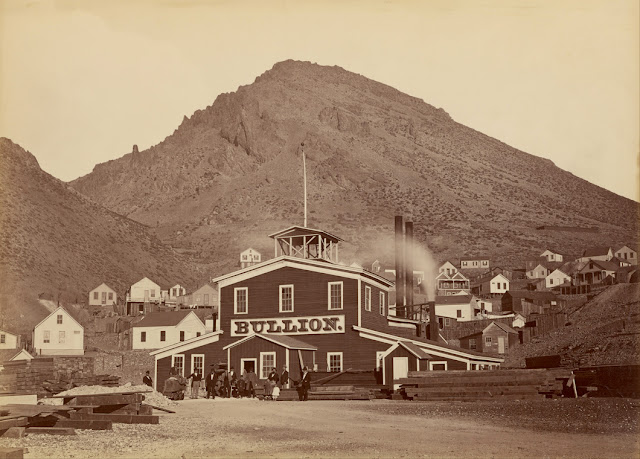by Glenn Franco Simmons
The pioneer Virginia City residents couldn't believe their eyes. Torn from a wooden pole on top of Mount Davidson, an American flag was carried by the fierce wind when it suddenly became illuminated by the setting sun peaking through storm clouds over the Sierras. The spectacle was so profound that a female poet took up the challenge and put the experience ~ which captivated countless onlookers on The Comstock Lode ~ to poetry.
This post reveals her long-lost poem, as well as the four American flags, any one of which may have been the flag torn asunder.
C.C. Goodwin mentions, in passing, poem titled "The Flag On Fire" by Anna M. Fitch in his literary masterpiece titled "The Comstock Club."
He notes that in July 1863, a heavy storm with thunder descended upon the pioneer mining outpost.
"… As the sun was disappearing behind Mount Davidson, the clouds broke and rolled away from the west,” writes Goodwin, “while at the same time a faint rainbow appeared in the East, making one of those beautiful spectacles common to mountainous regions.
"At the same time the flag on Mount Davidson caught the beams from the setting sun and stood out a banner of fire. This, too, is not an unfrequent spectacle in Virginia City, and long ago inspired a most gifted lady to write a very beautiful poem, 'The Flag on Fire.'"
"From the summit of Mount Davidson, looking westward from Virginia City, Nevada, float the stars and stripes," Fitch writes. "On the evening of July 30th, 1863, upon the breaking away of a storm, this banner was suddenly illuminated by some curious refraction of the rays of the setting sun. Thousands of awe struck persons witnessed the spectacle, which continued until the streets of Virginia, 1500 feet below, were in utter darkness."
At a time when there were sympathizers of The Union or the Confederacy in Virginia City, the poem was sure to inflame the pride of patriotism in the hearts of those who supported The Union.
The poem is cast in a reverential, almost religious, style, that seems to indicate a feeling among some observers that the illumination of the Stars and Stripes was somehow divinely ordained and proof that the United States of America would continue to prosper and be victorious in The Civil War.
What no writer mentioned was which American flag was atop Mount Davidson. We don't even know if it was one of the four most-current flags used by the United States.
 |
| An American flag used from 1861-63. Public domain. |
The Flag On Fire*
by Anna M. Fitch
Up the somber
Silent chamber
Of the silver-seamed Sierra,
Where the Pi-ute
Roams in quiet
And the eagle spreads her eyrie —
Climbed on our flag, and sat in splendor
Climbed our flag, and sat in splendor
Thronged with elemental wonder.
Flushed with warning,
Dawned the morning,
O'er Nevada’s gold-girt canons
While momentous
Clouds portentous
Beat aloft their dusky pinions,
And the lengthening day slow wheeling
'Neath its swarthy height was reeling
Now the marring
Lightning scarring,
Cleaves the mailed front of heaven,
Sifting, shifting,
Drifting, rifting,
Clouds capricious course till even,
So the swarthy army marches,
Conquering through the shadowy arches.
 |
| An American flag used from 1861-63. Public domain. |
Cloud-bemantled,
Storm-ensandled,
Droops the flag, all gloom-encompassed,
Now unfurling,
Waltzing, whirling,
To the music of the tempest —
While aloft the dark-browed legion
Marshals through the storm-wrapped region.
Now the crumbling
Shadows, tumbling
Into silver-skirted showers
Lo! Upbuildered
From the gilded
Eastern crags, a rainbow towers;
Linked with Carson’s purple fountain,
Circling the desert, vale and mountain.
Fire! Fire!
Fire! Fire!
Who has set the flag on fire?
What vile traitor
By Creator
Spurned, thus dare defy despair?
God of prophecy and power,
Stay the omen of the hour.
 |
| An American flag used from 1863-65. Wikipedia. Public domain. |
Oh! the splendor,
Oh! The wonder,
To the worshipping beholder!
Gathering, glowing
Flaming, flowing
Skyward — fiercer, freer, bolder
Burn the beating stars of empire,
Lit by traitor-torch, nor camp-fire.
Blood nor palette,
More than all that,
Mid those starry embers linger;
Tis an omen
Sent to no man —
Signet on an unseen finger —
Prophecy from heaven’s own portal,
Borne by winged worlds immortal.
Now circling
Darkness purpling,
Plumes the rock-ribbed mountain hoary;
Yet the hallowed,
Flag unpillowed,
Burns aloft in stilly glory;
Wonder-mute, no man inveigheth;
Peace, be still! a nation prayeth.
 |
| An American flag used from 1863-65. Public domain. |
In an obituary about Fitch published in "Paradise of the Pacific" Vols. 16-18 (Jan. 1, 1903), Fitch's literary accomplishments were noted.
"… She had literary tastes, and in the exercise of her talents displayed genius," according to the publication. "One particular poem she wrote, … titled 'The Song of the Flume,' was regarded by William Cullen Bryant as classic. She also wrote 'The Flag on Fire,' 'Over the Hill,' 'The Loves of Paul Fenly,' and 'Bound Down' — a book of Fate.
"She caught a good deal of her inspiration from the scenes, the incidents and the romances of the great Pacific Slope, where most of her life was spent. With her husband she wrote ‘Better Days,’ or a ‘Millionaire of Tomorrow,’ a tale of the present period dealing somewhat with the labor interests."


No comments:
Post a Comment
Spam comments will not make it to publication, so please do not spam this blog. All comments are moderated. Thank you for your consideration.